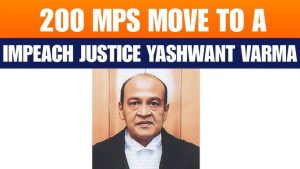The Supreme Court delivered a series of pointed questions to Justice Yashwant Varma on July 28, 2025, during hearings related to his challenge against an in-house inquiry committee report. The Justice Yashwant Varma cash row has become one of the most significant judicial accountability cases in recent times, with the apex court questioning why the judge waited until the inquiry’s completion to challenge the proceedings.

Also read: Justice Yashwant Varma cash row
The Supreme Court bench, comprising Justices Dipankar Datta and AG Masih, subjected Justice Yashwant Varma to intense scrutiny during Monday’s proceedings. The Court specifically asked, “Why did you appear before the inquiry committee? Did you come to the court to request that the video be removed? Why did you wait for the inquiry to be completed and the report to be submitted?” This questioning highlighted the central contradiction in the Justice Yashwant Varma cash row case – how could a judge challenge an inquiry process after actively participating in it?
The bench’s pointed interrogation centred on the fundamental principle of judicial conduct and procedural fairness. The Supreme Court grilled Justice Yashwant Varma for challenging the findings of the in-house inquiry panel report after participating in the process. This approach by the apex court indicates a serious concern about the timing and nature of the challenge in the Justice Yashwant Varma cash row.
The Justice Yashwant Varma cash row originated from a significant incident that occurred in March 2025. Following a fire, a large amount of unaccounted cash was found in Justice Varma’s official residence on March 14. This discovery triggered a series of events that would culminate in the current Supreme Court proceedings.
The Chief Justice of India subsequently constituted a three-member committee consisting of Justice Sheel Nagu, Chief Justice of Punjab & Haryana High Court, Justice G.S. Sandhawalia, Chief Justice of Himachal Pradesh High Court, and Justice Anu Sivaraman, Judge of Karnataka High Court, for conducting an inquiry into the allegations. The Justice Yashwant Varma cash row inquiry was thus initiated through proper judicial channels.
The inquiry committee’s investigation into the Justice Yashwant Varma cash row revealed critical findings that would shape the current legal challenge. The committee concluded that cash was found in the storeroom of the official residence of the High Court judge. These findings formed the basis of the misconduct allegations that Justice Varma now seeks to challenge.
The Court is hearing the petition filed by Justice Varma against the in-house committee report indicting him over the recovery of a large sum of unaccounted cash at his official residence in Delhi. The Justice Yashwant Varma cash row has thus evolved from an administrative matter to a significant legal challenge before the Supreme Court.
Senior Advocate Kapil Sibal, representing Justice Yashwant Varma, presented arguments challenging the committee’s conclusions. Sibal argued that the presence of cash in the outhouse of a sitting High Court judge does not mean there is “misconduct” or “proved incapacity” – the grounds required for judicial action. This defence strategy in the Justice Yashwant Varma cash row focuses on distinguishing between the mere presence of cash and proven misconduct.
The legal team’s approach suggests that the Justice Yashwant Varma cash row involves complex questions about the burden of proof and the standards required for establishing judicial misconduct. The defence appears to argue that circumstantial evidence alone cannot establish the requisite misconduct standards.
The Supreme Court’s questioning revealed deeper concerns about procedural consistency in the Justice Yashwant Varma cash row. The bench expressed puzzlement about why Justice Varma participated in the inquiry process if he had fundamental objections to its validity. This procedural aspect of the Justice Yashwant Varma cash row raises important questions about when and how judicial officers can challenge inquiry proceedings.
The Supreme Court asked Justice Yashwant Varma why he had waited until now to challenge the procedure adopted after half-burnt Indian currency notes were discovered in an outhouse of his residential premises. This timing issue has become central to understanding the Supreme Court’s approach to the Justice Yashwant Varma cash row.
The Justice Yashwant Varma cash row represents a significant test case for judicial accountability mechanisms in India. The Supreme Court’s handling of this matter will likely establish important precedents for how in-house inquiry challenges are evaluated. The case demonstrates the delicate balance between protecting judicial independence and ensuring accountability.
The proceedings also highlight the importance of procedural consistency in judicial conduct cases. The Justice Yashwant Varma cash row illustrates how participation in inquiry proceedings can complicate subsequent legal challenges, creating questions about waiver of objections and procedural estoppel.


The top court further quizzed Justice Varma over the parties he had made in his plea and said he should have filed the in-house inquiry report with his plea. These procedural requirements indicate the Supreme Court’s emphasis on proper documentation and transparency in the Justice Yashwant Varma cash row proceedings.
The Justice Yashwant Varma cash row continues to evolve as a landmark case in judicial accountability. The Supreme Court’s pointed questions about timing and procedural consistency reflect deeper concerns about the integrity of judicial inquiry processes. As proceedings continue, this case will likely establish important precedents for handling similar challenges to in-house inquiry reports, making the Justice Yashwant Varma cash row a defining moment for judicial accountability in India

